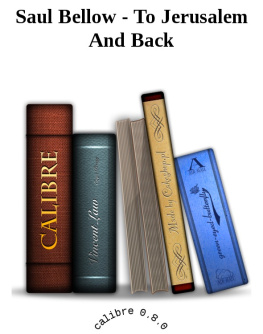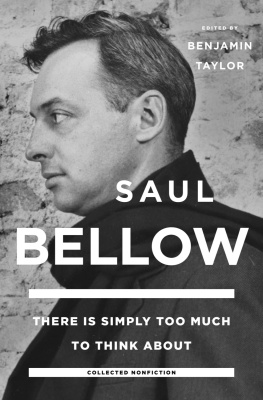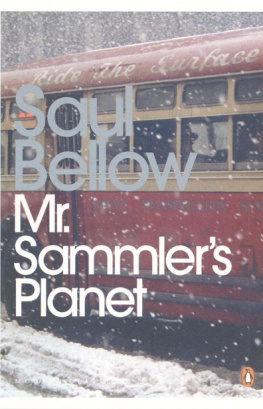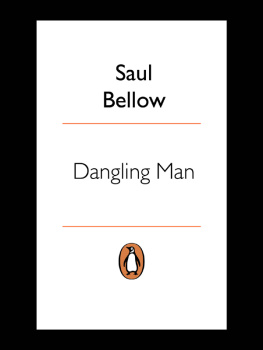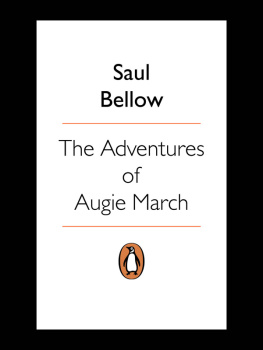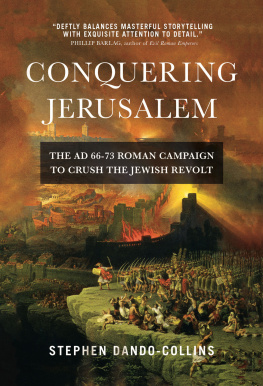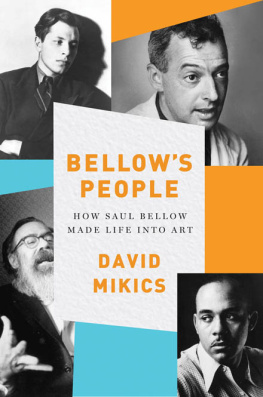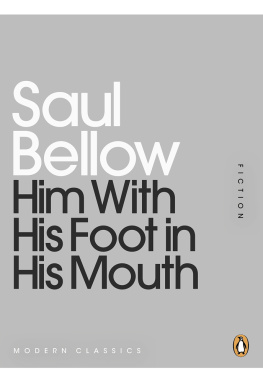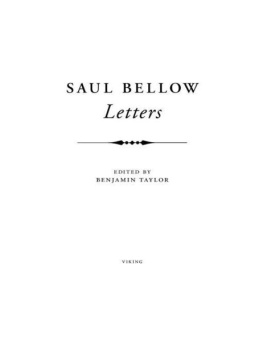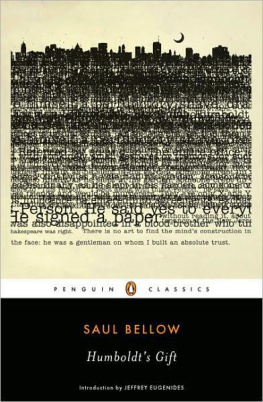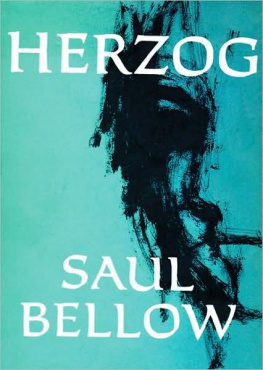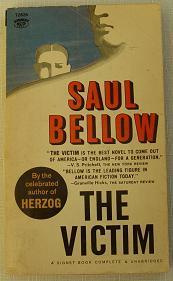Saul Bellow - To Jerusalem and Back (Classic, 20th-Century, Penguin)
Here you can read online Saul Bellow - To Jerusalem and Back (Classic, 20th-Century, Penguin) full text of the book (entire story) in english for free. Download pdf and epub, get meaning, cover and reviews about this ebook. year: 1998, publisher: Penguin Classics, genre: Detective and thriller. Description of the work, (preface) as well as reviews are available. Best literature library LitArk.com created for fans of good reading and offers a wide selection of genres:
Romance novel
Science fiction
Adventure
Detective
Science
History
Home and family
Prose
Art
Politics
Computer
Non-fiction
Religion
Business
Children
Humor
Choose a favorite category and find really read worthwhile books. Enjoy immersion in the world of imagination, feel the emotions of the characters or learn something new for yourself, make an fascinating discovery.
- Book:To Jerusalem and Back (Classic, 20th-Century, Penguin)
- Author:
- Publisher:Penguin Classics
- Genre:
- Year:1998
- Rating:4 / 5
- Favourites:Add to favourites
- Your mark:
- 80
- 1
- 2
- 3
- 4
- 5
To Jerusalem and Back (Classic, 20th-Century, Penguin): summary, description and annotation
We offer to read an annotation, description, summary or preface (depends on what the author of the book "To Jerusalem and Back (Classic, 20th-Century, Penguin)" wrote himself). If you haven't found the necessary information about the book — write in the comments, we will try to find it.
To Jerusalem and Back (Classic, 20th-Century, Penguin) — read online for free the complete book (whole text) full work
Below is the text of the book, divided by pages. System saving the place of the last page read, allows you to conveniently read the book "To Jerusalem and Back (Classic, 20th-Century, Penguin)" online for free, without having to search again every time where you left off. Put a bookmark, and you can go to the page where you finished reading at any time.
Font size:
Interval:
Bookmark:
Saul Bellow - To Jerusalem And Back
SECURITY measures are strict on flights to Israel, the bags are searched, the men are frisked, and the women have an electronic hoop passed over them, fore and aft. Then hand luggage is opened. No one is very patient. Visibility in the queue is poor because of the many Hasidim with their broad hats and beards and sidelocks and dangling fringes who have descended on Heathrow and are far too restless to wait in line but rush in and out, gesticulating, exclaiming. The corridors are jumping with them. Some two hundred Hasidim are flying to Israel to attend the circumcision of the firstborn son of their spiritual leader, the Belzer Rabbi. Entering the 747, my wife, Alexandra, and I are enfiladed by eyes that lie dark in hairy ambush. To me there is nothing foreign in these hats, sidelocks, and fringes. It is my childhood revisited. At the age of six, I myself wore a tallith katan, or scapular, under my shirt, only mine was a scrap of green calico print, whereas theirs are white linen. God instructed Moses to speak to the children of Israel and to bid them that they make them fringes in the borders of their garments. So they are still wearing them some four thousand years later. We find our seats, two in a row of three, toward the rear of the aircraft. The third is occupied by a young Hasid, highly excited, who is staring at me.
Do you speak Yiddish? he says.
Yes, certainly.
I cannot be next to your wife. Please sit between us.
Be so good, he says.
Of course.
I take the middle seat, which I dislike, but I am not really put out. Curious, rather. Our Hasid is in his late twenties. He is pimply, his neck is thin, his blue eyes goggle, his underlip extrudes. He does not keep a civilized face. Thoughts and impulses other than civilized fill it-by no means inferior impulses and thoughts. And though he is not permitted to sit beside women unrelated to him or to look at them or to communicate with them in any manner (all of which probably saves him a great deal of trouble), he seems a good-hearted young man and he is visibly enjoying himself. All the Hasidim are vividly enjoying themselves, dodging through the aisles, visiting, chattering, standing impatiently in the long lavatory lines, amiable, busy as geese. They pay no attention to signs. Dont they understand English? The stewardesses are furious with them. I ask one of the hostesses when I may expect to receive a drink and she cries out in irritation, Back to your seat! She says this in so ringing a voice that I retreat. Not so the merry minded Hasidim, exulting everywhere. The orders given by these young gentile uniformed females are nothing to them. To them they are merely attendants, exotic bediener, all but bodyless.
Anticipating a difficulty, I ask the stewardess to serve me a kosher lunch. I cant do that, we havent enough for them, she says. We werent prepared. Her big British eyes are affronted and her bosom has risen with indignation. Weve got to go out of our way to Rome for more of their special meals.
Amused, my wife asks why I ordered the kosher lunch. Because when they bring my chicken dinner this kid with the beard will be in a state, I explain.
And so he is. The British Airways chicken with the chill of death upon it lies before me. But after three hours of security exercises at Heathrow I am hungry. The young Hasid recoils when the tray is handed to me. He addresses me again in Yiddish. He says, I must talk to you.
You wont be offended?
No, I dont think so.
You may want to give me a slap in the face.
Why should I
You are a Jew. You must be a Jew, we are speaking Yiddish. How can you eat-that I It looks awful, doesnt it?
You mustnt touch it. My womenfolk packed kosher beef sandwiches for me. Is your wife Jewish?
Here Im obliged to lie. Alexandra is Rumanian. But I cant give him too many shocks at once, and I say, She has not had a Jewish upbringing.
She doesnt speak Yiddish?
Not a word. But excuse me, I want my lunch.
Will you eat some of my kosher food instead, as a favor?
With pleasure.
Then I will give you a sandwich, but ouly on one condition. You must never-never-eat trephena food again.
I cant promise you that. Youre asking too much.
And just for one sandwich.
I have a duty toward you, he tells me. Will you listen to a proposition?
Of course I will.
So let us make a deal. I am prepared to pay you. If you will eat nothing but kosher food, for the rest of your life I will send you fifteen dollars a week.
Thats very generous, I say.
Well, you are a Jew, he says. I must try to save you.
How do you earn your living?
In a Hasidic sweater factory in New Jersey. We are all Hasidim there. The boss is a Hasid. I came from Israel five years ago to be married in New Jersey. My rabbi is in Jerusalem.
How is it that you dont know English?
What do I need English for? So, I am asking, will you take my fifteen dollars?
Kosher food is far more expensive than other kinds, I say. Fifteen dollars isnt nearly enough.
I can go as far as twenty-five.
I cant accept such a sacrifice from you.
Shrugging, he gives up and I turn to the twice disagreeable chicken and eat guiltily, my appetite spoiled.
The young Hasid opens his prayer book. Hes so fervent, says my wife. I wonder if hes praying for you.
She smiles at my discomfiture.
As soon as the trays are removed, the Hasidim block the aisles with their Minchah service, rocking themselves and stretching their necks upward. The bond of common prayer is very strong. This is what has held the Jews together for thousands of years. I like them, says my wife. Theyre so lively, so childlike.
You might find them a little hard to live with, I tell her. Youd have to do everything their way, no options given.
But theyre cheerful, and theyre warm and natural.
I love their costumes. Couldnt you get one of those beautiful hats?
I dont know whether they sell them to outsiders.
When the Hasid returns to his seat alter prayer, I tell him that my wife, a woman of learning, will be lecturing at the Hebrew University in Jerusalem.
What is she?
A mathematician.
He is puzzled. What is that? he asks.
I try to explain.
He says, This I never heard of. What actually is it they do?
I am astonished. I knew that he was an innocent but I would never have believed him to be ignorant of such a thing. So you dont know what mathematicians are. Do you know what a physicist is? Do you recognize the name of Einstein?
Never. Who is he?
This is too much for me. Silent, I give his case some thought. Busy minded people, with their head-culture that touches all surfaces, have heard of Einstein. But do they know what they have heard? A majority do not. These Hasidim choose not to know. By and by I open a paperback and try to lose myself in mere politics. A dozen Hasidim in the lavatory queue stare down at us.
We land and spill out and go our separate ways. At the baggage carousel I see my youthful Hasid again and we take a final look at each other. In me he sees what deformities the modern age can produce in the seed of Abraham. In him I see a piece of history, an antiquity.
It is rather as if Puritans in seventeenth century dress and observing seventeenth century customs were to be found still living in Boston or Plymouth. Israel, which receives us impartially, is accustomed to strange arrivals.
But then Israel is something else again.
We are staying in Jerusalem as guests of the Mishkenot Shaananim, the dwellings of serenity.
Mayor Teddy Kollek, irrepressible organizer of wonderful events (some of them too rich for my blood) , takes us to dinner with one of the Armenian Archbishops in the Old City. On the rooftop patio of the opulent apartment are tubs of fragrant flowers. The moon is nearly full. Below is the church, portions of which go back to the fourth century. The Archbishop is, to use an old word, a portly man. His cassock, dark red, swells with the body. On his breast two ball-point pens are clipped between the buttons. He has a full youthful clever face; a black beard, small and tidy. The eyes are green. Present are Isaac Stem; Alexander Schneider, formerly of the Budapest String Quartet; Kolleks son, Amos; two Israeli couples whom I cannot identify; and the foreign-news editor of Le Montie, Michel Tatu. In the Archbishops drawing room are golden icons. In illuminated cases are ancient objects. I can seldom get up much interest in such cases and objects. Middle-aged Armenians serve drinks and wait on us. They wear extremely loud shirts, blue-green sprigged with red berries, but they strike me as good fellows and are neat and nimble about the table. The conversation is quick and super knowledgeable. In French, in English, in Hebrew, and occasionally in Russian. (Tatu, who lived for years in Moscow, chats in Russian with Stem and Schneider.) The Archbishop, who has himself cooked the eggplant and the leg of lamb, tells the company his recipes. He and Kollek discuss seasonings. Schneider recalls a great Armenian. musician and teacher (his own teacher) named Dirian Alexanian, editor of Bachs Suites for Cello Unaccompanied and the most intolerant perfectionist
Next pageFont size:
Interval:
Bookmark:
Similar books «To Jerusalem and Back (Classic, 20th-Century, Penguin)»
Look at similar books to To Jerusalem and Back (Classic, 20th-Century, Penguin). We have selected literature similar in name and meaning in the hope of providing readers with more options to find new, interesting, not yet read works.
Discussion, reviews of the book To Jerusalem and Back (Classic, 20th-Century, Penguin) and just readers' own opinions. Leave your comments, write what you think about the work, its meaning or the main characters. Specify what exactly you liked and what you didn't like, and why you think so.

